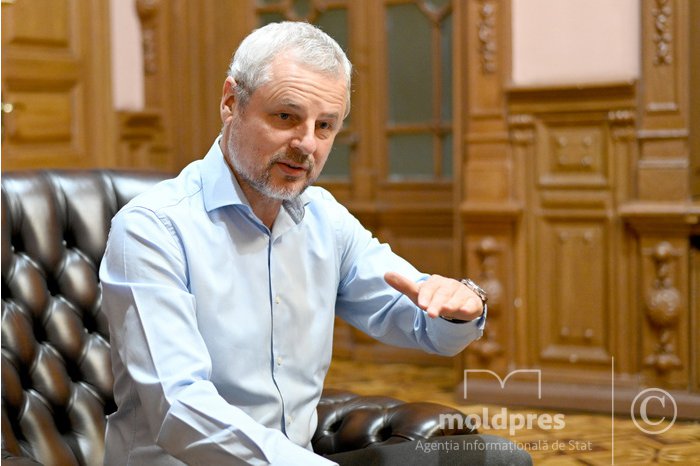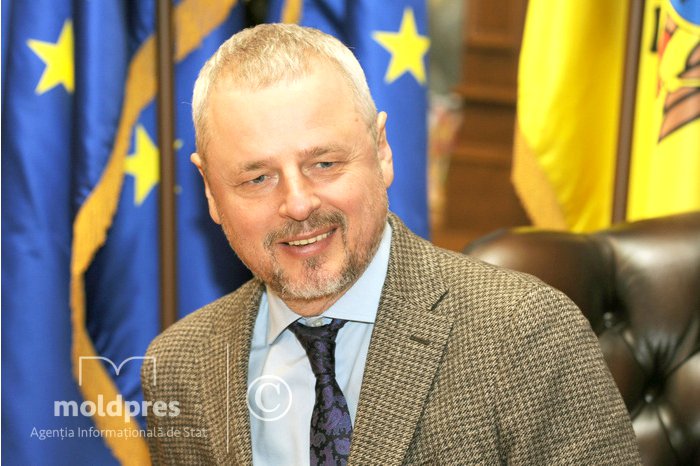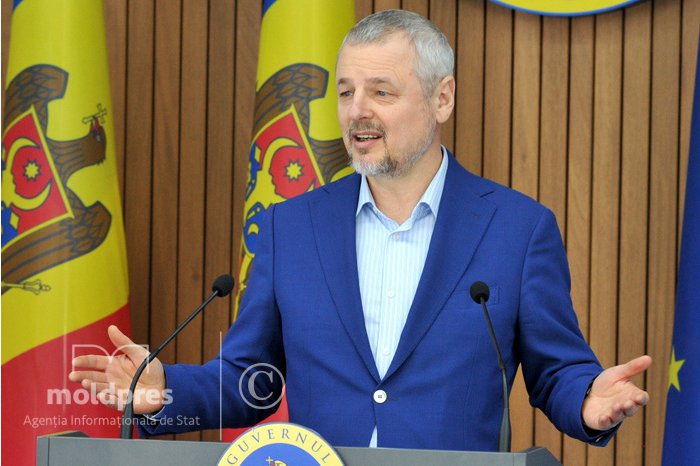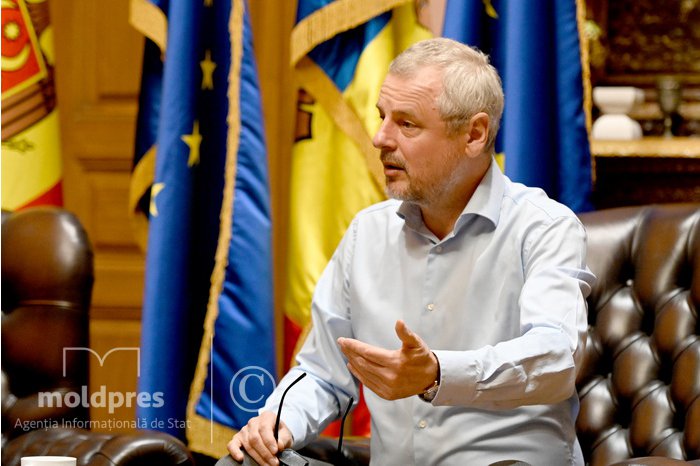EUROPEAN MOLDOVA // Minister of Culture: We contribute to our European integration by promoting Moldova, showing world we are part of European culture
17:13 | 09.05.2024 Category: Interview, Event
*Moldova applied for EU membership on 3 March 2022
* Moldova was granted EU candidate status on 23 June 2022
*On 14 December 2023, the European Council decided to open accession negotiations with Moldova
*Moldova undergoing assessment of the alignment of national legislation with European Union law, a first step for our state’s accession to the EU
*Authorities aim for Moldova to join the EU by 2030
Interview given with MOLDPRES State News Agency by Culture Minister Sergiu Prodan
MOLDPRES: Mr. Minister, the European tour made by the Mihai Eminescu National Theatre in March-April marked the cultural life of our fellow countrymen from abroad. How did you manage to organize the tour and which was its impact on the process of Moldova’s European integration?
Sergiu Prodan: Really, the tour of the National Theatre, made for the first time ever within the Martisor all Over the World campaign, was a resounding success. During only five weeks, the play, The Star Without a Name, by Mihail Sebastian, stage management by Alexandru Cozub, was played with full hall in ten European cities, assembling over 4,000 spectators. They are our fellow countrymen from the biggest communities of Moldovans from Europe, whom we comforted the longing for home and reminded them how nicely the Romanian language sounds. Yet, I am happy that we had in the audience also local residents curious to discover our country, diplomats and the text was translated and subtitled on screens in the English, Italian, Spanish and French languages namely for them. This, we contribute to our European integration, both by promoting Moldova and showing the world that we are part of the European culture.
MOLDPRES: You have earlier said that such projects of cultural diplomacy must be multiplied and have continuity and along with the artistic potential, the economic one must be involved as well. How this might occur?
Sergiu Prodan: The cultural diplomacy has always been the most efficient instrument, in order to consolidate the Diaspora, helping it to preserve the identity of nation and the traditions, as well as to promote Moldova’s image in the world. I want to thank once again our diplomatic representations from those eight countries – Portugal, Germany, Spain, Italy, France, the United Kingdom, Ireland and Belgium, as well as the Embassies of Romania and the Romanian Cultural Institute. Without their effort, without their reliable help, it would have been much more difficult to carry out this venturesome project.
At the same time, this tour showed us once again that we have also potential and capacity to export our cultural product and- the most important thing, - consumers interested in it. Now, it is the turn of the culture sector’s entrepreneurs to take over the initiative and to turn to good account the potential of the artists and the interest of the audience.
MOLDPRES: Which artistic bands from Moldova might implement such projects?
Sergiu Prodan: The immediate answer – anyone who has a qualitative cultural product. It matters for it to be well thought out and well promoted – and we have already numerous examples of events organized by our artists, under commercial basis, abroad. Hence, this can be done. An idea which, for instance, can be achieved represents the plays for children. I am sure that the latter might enjoy popularity especially among our fellow countrymen who live abroad and who want to cultivate to their children the love for the Romanian language, help them not forget it. With reasonable prices, of course, maybe with certain support on behalf of the state, but carried out by economic agents.
MOLDPRES: You have recently announced the foundation of the Universe Centre of Contemporary Culture and Art. What the project consists in and how the future centre will work?
Sergiu Prodan: The need to create a modern centre of contemporary culture and art in Chisinau has been discussed for a long time and I am happy that we have made the first step to this end. We want to set up an absolutely new space in terms of spirit and concept, which we are to put in the service of the cultural life of the capital and of the country. The Universe will host projects of the independent cultural sector, creation workshops and art galleries, bookshops and a movie theatre where we will screen author films. The building No 3 of the National Library will also be placed here – the institution’s depositary, conferences, artistic and teaching activities with a strong social impact will be organized.
Our goal is to reanimate the cultural life in the historical centre of the capital and to fulfill our commitments towards the cultural associations and independent artists, to the creative community and art consumers. We launched a call to the independent cultural sector to come up with suggestions about what the Universe Centre of Contemporary Culture and Art should contain. We will analyze these proposals and, by common agreement, we will include them in the final concept of the future Centre. This is a complex process and we rely also on the innovating contribution of the creative industries.
MOLDPRES: As for the creative industries, this spring, the government approved the Creative Moldova National Programme of Development of Creative Industries for the 2024-2027 years. What this document provides for and which are its goals?
Sergiu Prodan: Creative Moldova 2024-2027 is a document of complex medium-term policies, the goal of which is to give an impetus to the sector of creative industries, turn it more competitive and boost its presence in the country’s economy. The programmes regards seven sub-sectors – Visual arts (five arts, photography, design, fashion), Arts of show (theatre, dance, music), Editing (book and press), Audiovisual (radio, television, cinematography, video), Advertising, Createch (new media art, games) and Architecture – and the professions who carry out their activity in these fields. In fact, it is about an important sector, which brings together more than 2,200 enterprises with about 9,000 employees, as well as 2,500 free-lance employees.
The Programme’s objectives deal with: strengthening of the sector through good governance systems, joint normative framework and of policies and consolidated position for ensuring the economic growth, creation of dynamic and sustainable eco-system for creative activities, based on the interconnection of the creative industries, use of technologies and growth of the export of qualitative creative assets and services; boosting of the role of the creative industries in the country’s economic and social resilience.
MOLDPRES: To what extent this programme meets our European aspirations?
Sergiu Prodan: The creative industries represent an engine for the societies and economies of more European countries, being a priority at the level of the European Union. Certainly, they fit also into our European integration way, through the rapprochement with the policies and goals of the Creative Europe Programme for 2021-2027 and through the synchronization of the actions nationally with the European ones during time.
Moldova is creative and we must turn to good account the creative potential of our people. We should create a friendly environment for the development of a dynamic and sustainable sector, turning the creative industries more competitive and more present in the country’s economy. For this, the sector needs a single framework of work and development, which is to join it to the other sectors of the economy and Moldova should become a major creative centre in the Eastern Europe. And given that the human talent and capital are at the basis of the creative industries, we want to keep all these talents at home. We can do this by creating new professions, working out laws which are to encourage and back the creation of new jobs in the sector, by launching projects which are to support the artists and optimize the work. At the same time, we must extend the advantages of the creative industries in the regional and local communities, in order to ensure together the sustainable development of the entire country.
MOLDPRES: In the last years, the Culture Ministry has launched more initiatives aimed at protecting the cultural heritage of Moldova. Which are the practical changes which occurred following the ministry’s intervention?
Sergiu Prodan: In the 2022 and 2023 years, Moldova made more steps to ensure the protection and turning to account of the national cultural heritage, preserve the heritage objects and harmoniously include them in the cultural and historic circuit. More amendments were made to the legislation, which represent a change of the state policy for the protection of the heritage. A continuous analysis of the normative framework in the field of protection of the heritage is made, with sustained efforts for remedying the deficiencies. By upgrading and improving the legislation in the heritage sector, we have provided and will provide, in continuation, the instruments necessary for the efficient conservation of our cultural and historical heritage.
Also, the reorganization of the institutions involved – the Agency of Inspection of Monuments and the National Council of Historical Monuments, as well as the creation of new structures in the sector – National Inspectorate of Heritage and the Fund of Restoration of Heritage, will lead to the optimization of the processes of conservation and protection of the heritage. A significant achievement is the elaboration and adoption, in the first reading, of the National Archaeological Register, which includes over 11,000 archaeological sites. This Register will become the foundation stone of the archaeological database and will allow consolidating the capacities in the protection and turning to good account of the archaeological heritage. Also, we approved the Regulation on the circulation of the cultural assets and founded the Service of circulation and registration of the mobile cultural assets, marking our commitment for the reform of the system in line with the European standards.
This is an essential field for a society willing to be sound and strong. A society which cares about the values of the past, not only in order to protect its cultural heritage, but also to create a solid foundation or a richer and wiser future. We can succeed this, by protecting the cultural and historical wealth of our own site, of our own country - and this is what we actually do. The Soroca Fortress and the Old Orhei, the historical centre of Chisinau and the monasteries from Moldova’s Forests, the Metropolitan Cathedral and the Causeni Church – we resonate with them, will preserve our backbone and the conscience of nation with them, the world will know us with them.
MOLDPRES: You have mentioned the historical centre of Chisinau. One of the initiatives announced by the Culture Ministry this year is namely the turning to good account of this zone, through the creation of a Historical District in the perimeter of the streets Metropolitan Banulescu-Bodoni and Pushkin. This district is supposed to include also the portion with historical pavement on the 31 August 1989 Street. At what stage the project is and which is the fate of the pavement which the ministry recommended to be conserved?
Sergiu Prodan: Last year, the Culture Ministry held more discussions on opportunities of arrangement of the 31 August 1989 Street. Along with representatives of the Chisinau city hall, civil society and of the professional community, a conclusion was reached that this street segment should be pedestrian. The city hall instructed the working out of a first draft by architect Roland Rotar. And the ministry started working with Mr. Rotar on a single project of this district, in the perimeter of which there are more historical and heritage buildings, such as the National History Museum, National Art Museum and the National Library.
In this way, we reached the idea of a Historical District, this is how we conventionally called it, with more public areas, where social and cultural events are to be held simultaneously and which will be the first one in Chisinau and all over the country. At a news conference held in early February 2024, we presented a single project, but with joint financing. More exactly, some of the grounds which belong to the state should be financed by the ministry and the others – by the city hall. We made an official approach to the Chisinau city hall and the Chisinau Municipal Council for the creation of a single working group. We still expect solutions.
MOLDPRES: How the national culture Fund, created at the end of the last year, works in order to become a new mechanism of financial support of the independent and private cultural sector in the field of creative arts and industries?
Sergiu Prodan: First of all, I want to say that the creation of this fund is part of the national action plan for Moldova’s accession to EU and was a priority of the Culture Ministry for the 2023 year. Hence, we have a proof of the efforts of European integration of the culture sector from Moldova.
The main task of the Fund is the financing of the projects dealing with the contemporary creation and the turning to good account of the heritage, as well as the contribution to the good understanding of the artistic phenomena and the ensuring of the public’s as wider as possible access to culture. We will support the cultural and editorial projects elaborated within six intervention sectors: initiatives by non-commercial organizations in the culture field; editorial activity and of literary translations; cultural magazines; the field of arts, studies and analyses, including activities of continuous professional training in the culture field; local programmes on cultural development and programmes of residency and artistic and cultural mobility. Presently, the culture Fund cumulates all cultural and editorial programmes and projects managed by the Culture Ministry, which totalizes an estimated sum of 29.6 million lei, included in the state budget law for 2024.
The Fund will be managed by an implementing institution subordinated to the Culture Ministry – National Centre of Education through Art, which will be reorganized. We are confident that, already in 2024, we will have concrete results and with impact. I urge all artists to come up with projects which are to enrich the native cultural product. No matter where it is made. I am sure that we can do this together and the National Culture Fund will be the valuable resource due to back these processes.
MOLDPRES: Also starting from 2024, the Culture Ministry is in charge of the mass media policies – another important sector for the European integration. How this process develops?
Sergiu Prodan: Just on 2 May, on the eve of the World Press Freedom Day, we discussed these subjects with representatives of press associations from Moldova. We spoke about the current and future priorities, expectations of the mass media community in this respect and the actions which we have undertaken so far for the carrying out of the national programme on development of the mass media for the 2023-2026 years. We presented also the concept of the mass media policies directorate of the Culture Ministry, which is under creation. It will deal with the legal framework in the field and with the adjusting of the national legal norms to the European ones; with policies and mechanisms of work, as well as with the providing of a platform of a permanent and transparent communication with mass media representatives. We hope to identify enthusiastic and ambitious professionals, including from the civil society – and we even urge you to come up with recommendations, if you know people who are to accept the challenge and give a helping hand to this activity.
MOLDPRES: What is the stage of the creation of the Fund for subsidization of mass media, so much expected by journalists?
Sergiu Prodan: The Fund fits into the logical actions on the creation of the new structures in the sector. As soon as the Directorate is set up, we will start the creation of the council of experts – an independent entity, which will not depend on the Culture Ministry at all. It will be made up of representatives nominated by the Press Council or representative organizations of the civil society for the field, plus by one representative of the Culture Ministry, Education and Research Ministry and Finance Ministry. The task of the Culture Ministry is here to provide technical and logistic support.
The mass media institutions which will benefit from subsidies on behalf of the state will be selected by contest by the Council of Experts, which will decide the terms and the principles of selection of the beneficiaries, the frequency of contests and other aspects regarding the work of the Fund. We estimate that the first call within the contest on financing of media projects will be announced in next autumn. Everything will be made with maximal transparency, and our goal and task will be for the Fund for subsidization of mass media to fully contribute to the media pluralism and the strengthening of the editorial and economic independence of the mass media.
MOLDPRES: Dear Mr. Minister, thank you for the interview and I wish you much success!
Reporter: Nicolae Roibu




